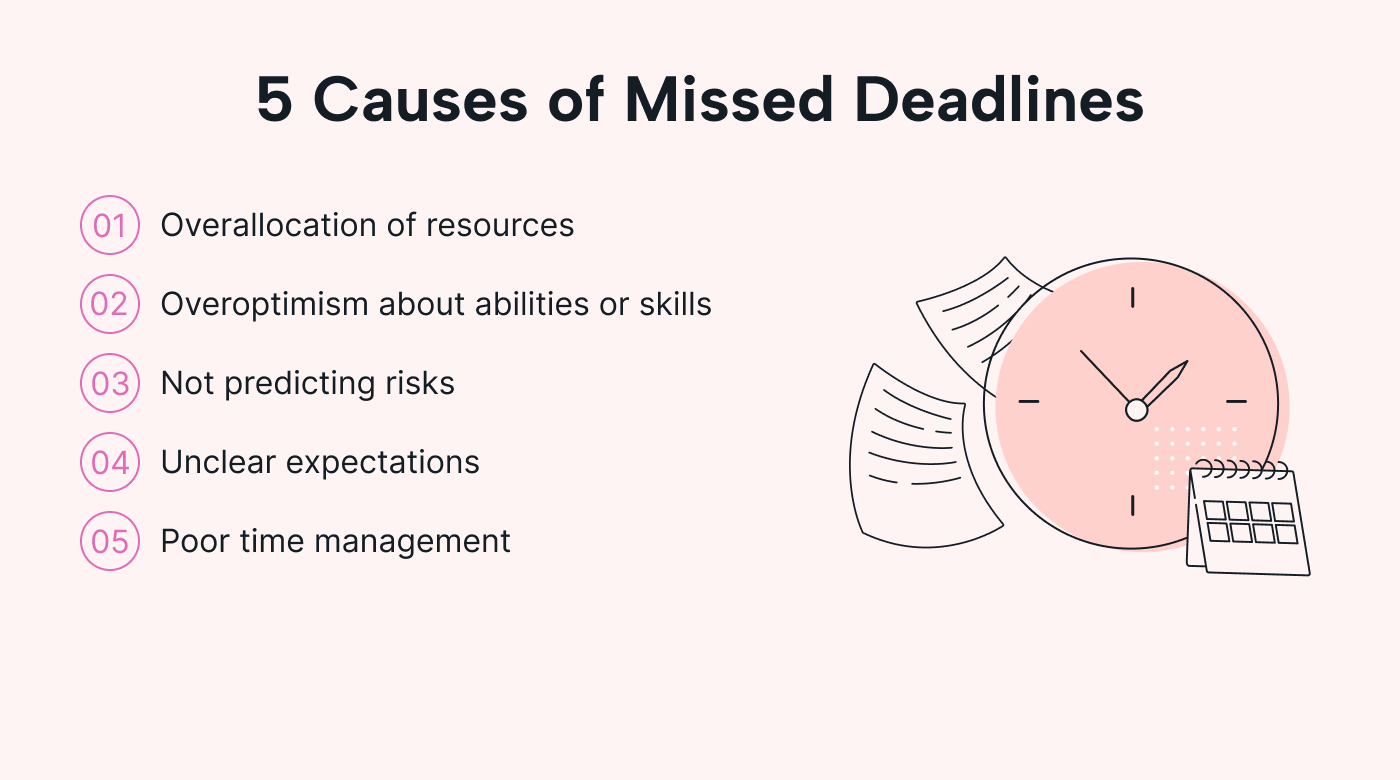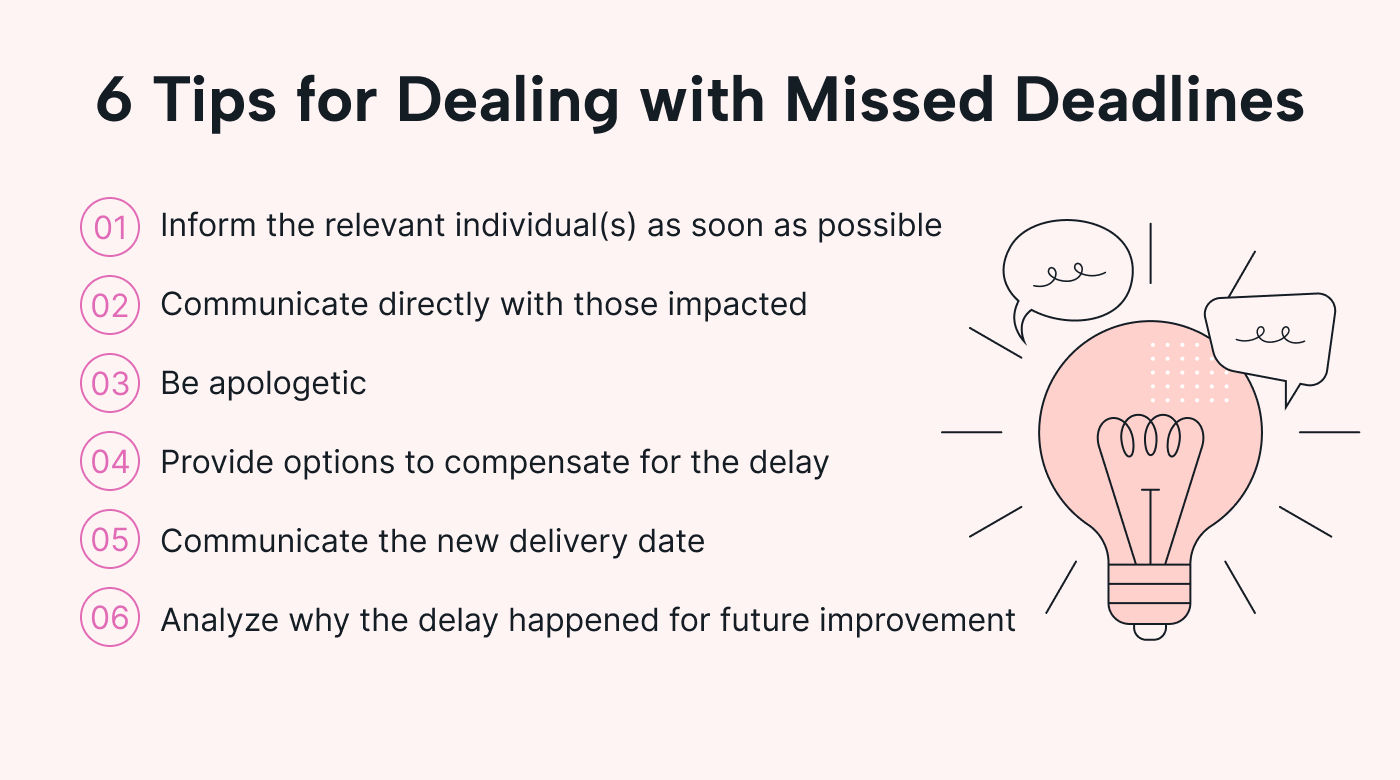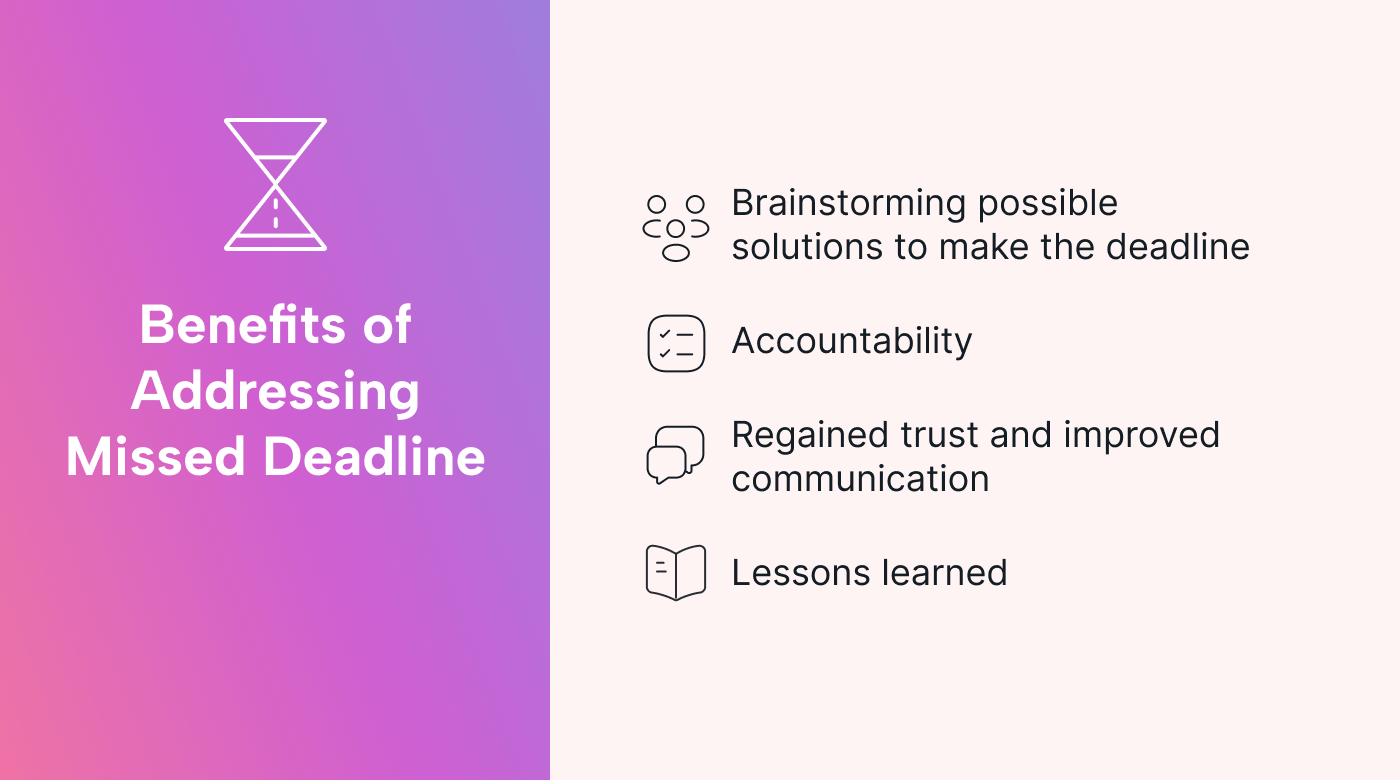We’ve all missed a deadline at some point. Maybe a power outage or supply issue caused a delay, for instance.
We understand that things happen, and sometimes, a missed deadline can’t be avoided. However, if your project team misses deadlines a lot, then it’s time to take a look at the possible causes.
In this article, we’ll take a look at missed deadlines, including their causes, how to prevent them, and their consequences. While we’ll examine this topic in the context of projects, note that these principles can also apply to deadlines in your personal life.
Five causes of missed deadlines
No one intentionally misses a deadline. If you find that your team is missing deadlines consistently, then it’s time to evaluate what might be causing them. Let’s look at some common causes.
 |
1. Overallocation of resources
If your team is too optimistic about how many hours they can devote to a project, they’re setting themselves up for a missed deadline.
Don’t assume your team can spend all their work hours on projects. Consider other tasks that they have on their plate, too, such as meetings, email responses, and status reports.
You also should keep in mind that any team member might have something urgent come up, such as a pressing request from a client. If you don’t leave room in their schedules for them to deal with their other responsibilities, project deadlines will always be at risk.
2. Overoptimism about abilities or skills
If a project requires more skill than initially thought, it will likely be delayed or need other resources assigned.
Perhaps a programmer who is working on a webpage project doesn’t realize that the programming language they are most familiar with is insufficient for them to accomplish the project goal. They then need to spend time researching a new option.
3. Not predicting risks
No project is risk-free. Assuming a project will run with no hiccups sets you up for a potential missed deadline. A hiccup is something that wasn’t predicted. Many risks can be anticipated and mitigated.
4. Unclear expectations
If a project scope is not well defined, the project deliverables might require many adjustments and additional work. The team and client must be on the same page from the get-go. If they aren’t, then the project will drag out as changes must be made.
5. Poor time management
If team members don’t manage their time well — perhaps due to being pulled in too many directions at once — it can be hard for them to meet their project deadlines. It would then be fair to ask what the project manager should have known about their resources.
How to prevent missed deadlines
Let’s look at some solutions to help tackle the causes of missed deadlines we discussed above.
1. Set clear expectations
Make sure your team has clear expectations from the get-go. Stakeholders should sign off on project scope statements and other documents to keep their expectations in check. This will keep your project schedule from derailing.
2. Include buffer time
Consider incorporating buffer time into projects by adding extra hours or days to individual tasks or at the end of the project. With buffer time scheduled, you’ll have a better chance of meeting the project deadline, even if an issue comes up. Plus, as a bonus, if you don’t use your buffer time and the project is delivered early, no one will complain — and you’ll be ahead of the game.
3. Try time blocking
You can also implement time blocking to give your team uninterrupted stretches to work on projects. As a result, they can get more done without losing their train of thought and having to regroup.
4. Set milestones
Set project milestones to meet along the way, too. If you have a large project due in three months, for instance, establish mini-target dates over its course. As your team meets these milestones, they’ll know that they’re on track to meet the final deadline.
5. Track your tasks
Keep track of your tasks so that nothing is overlooked. Consider a tool like Motion’s Task Manager to help you organize everything on your plate. And when you combine the Task Manager with Motion’s Intelligent Calendar, your tasks are added to your schedule in the most optimal spots.
6. Create a risk register
Consider creating a risk register to help you plan how to deal with project risks as they come up. When you define your risks in advance, you can keep a watchful eye out for them and have a solution in place to deal with them as soon as they occur. This puts you in a better position to keep your projects on schedule.
Tips for handling missed deadlines
Despite your best efforts to prevent missed deadlines, it’s likely to happen occasionally.
Fortunately, there are steps you can take to handle them as they come up. Here are just a few:
 |
1. Inform the relevant individual(s) as soon as possible
Team members should be upfront with their supervisor as soon as they know they are going to miss a deadline. The supervisor may have a solution to their problem.
Sometimes, however, there will not be a solution. If a project won’t be delivered on time, the client needs to be notified so that they can make any necessary adjustments on their end. For example, if your client is a bakery that was expecting an online ordering website to go live on February 1, but the deadline won’t be met, then they’ll need to be informed so that they can adjust to continue taking only phone and walk-in orders.
2. Communicate directly with those impacted
Consider the best way to deliver the news — in person, if possible, or on the phone. A missed deadline isn’t something that should be delivered through email or text — these things can be overlooked or not read immediately.
The customer should be able to discuss the situation with you in real time so that their concerns can be addressed.
3. Be apologetic
This one goes without saying. Apologize to the customer about the missed deadline.
4. Provide options to compensate for the delay
Consider what you can do to make up for the inconvenience. Can you give the customer a discount on the project? Is there another feature you can deliver for them as a bonus after you complete the late project? What are the possible approaches to fix the problem?
5. Communicate the new delivery date
Let the customer know when they can now expect the delayed project, and continue to keep the lines of communication open.
6. Analyze why the delay happened for future improvement
Discuss a plan with your team to make sure the same issue doesn’t happen in the future. For example, can the team hold an expectation-setting session with the customer prior to the project’s start to make sure everyone is on the same page?
Three consequences of missed deadlines
If your team misses deadlines frequently, your business can be negatively impacted in multiple ways.
1. Lost customers
Customers who can’t depend on you to make planned deadlines lose confidence in you. They may then begin searching for new providers of products and services.
2. Delays in other projects
If one of your projects is delayed, other planned projects may fall behind, too, because of resource conflicts.
Let’s say your website development team is supposed to wrap up a project for a grocery store on December 1 and start a new project for a pet store on December 2. If the first project doesn’t wrap up until December 5, then the second one will start a few days late.
3. Employee stress and burnout
When projects continuously run behind, employees will often work overtime to try to catch up. The developers of the pet store website project in our example above may now feel pressure to work unrealistic hours to try to get the pet store website back on track.
If you set deadlines that your employees struggle to meet, the work environment can become a source of stress for those individuals. And if your employees are continuously stressed, they are more likely to experience burnout — and to go on the hunt for a new job.
Benefits of effective response to missed deadlines
Here are several benefits to addressing missed deadlines:
Brainstorming possible solutions to make the deadline
Don’t miss the deadline at all. If you are concerned that your team won’t make a deadline, talk with them to see if there is any way they can still do it. Given enough notice, a team member may have an idea to help another get their task completed by the deadline.
If you’re certain that a deadline won’t be met, your team may be able to come up with an interim workaround for the customer. For example, if a programming update for a data issue is delayed, consider whether a data correction program can be run at regular intervals to fix the bad data until the update is ready.
Accountability
If you’re candid about the missed deadline, stakeholders will know they can count on you to bring issues to their attention.
However, if you aren’t upfront about missing a deadline, and stakeholders find out about the issue later, you will be viewed as unreliable — and that’s not a good thing for your business.
Regained trust and improved communication
If you miss a deadline without communicating the issue to the customer, they will lack confidence about promised deliveries from your team.
However, if you update them when there is a delay, they will know they can depend on you to keep them informed.
Client relationships are always better with forthright communication. When you provide clients with updates about delays that occur and when solutions are expected, the lines of communication between you remain open.
Lessons learned
You can use what you’ve learned about missed deadlines to prevent them from happening in the future.
 |
Let’s pretend that our grocery store website was delayed because a development server went down for a day due to a hardware failure. The team didn’t have a backup server to use, and the Network Services department scrambled to get the server back up. The team may then propose adding a backup server to prevent future situations like this.
Use Motion to help you avoid missing deadlines
Awareness of an imminent missed deadline allows you to brainstorm solutions, such as delegating tasks to others who have more time or adding more resources to a project.
You can also use Motion to help you avoid this issue.
Motion’s artificial intelligence has all the data it needs to schedule all your tasks in the optimal time slots. You don’t have to constantly think about your schedule yourself — or find out about missing a deadline after the fact.
Motion also takes the worry out of monitoring your tasks by alerting you if it a deadline will likely be missed. Less planning and less stress means more time to work on your projects.
If you’re not using Motion (yet), sign up for a free trial today.






